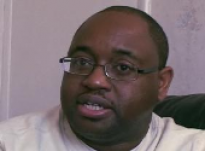Lawrence - Diabetes Type 2

Diagnosed a year ago, Lawrence takes gliclazide and losartan.
Lawrence works in the catering trade and is married with three young children. Ethnic background/Nationality - Born in Zimbabwe.
For more clips from this interview click here.
More about me...
Lawrence recommends finding out as much as possible and discussing information with the GP and diabetes nurse. He takes treatment seriously because he understands why it is necessary.
Lawrence recommends finding out as much as possible and discussing information with the GP and diabetes nurse. He takes treatment seriously because he understands why it is necessary.
But the other thing I did was go on the internet, but I was searching in terms of topic, I didn't know any websites to go to, so I just searched by topic then in terms of, you know, diabetes and social diabetes, and sex with diabetes, and food, and looked through those and read those, and, and really while I might not have a specific book or a specific website to, to recommend, what I do recommend is just soak yourself with information, information, information. Because it helps you (a) in terms of making decisions about how you're going to conduct your life and (b) in terms of understanding the condition that you have, because if you don't understand it it'll be extremely difficult to, to get around it, life and it'd be extremely difficult to manage it, and, to comply with what the doctor tells you, because you might think the doctor's just, you know, giving you grief, but in effect he's just, you know, giving you the correct information.

